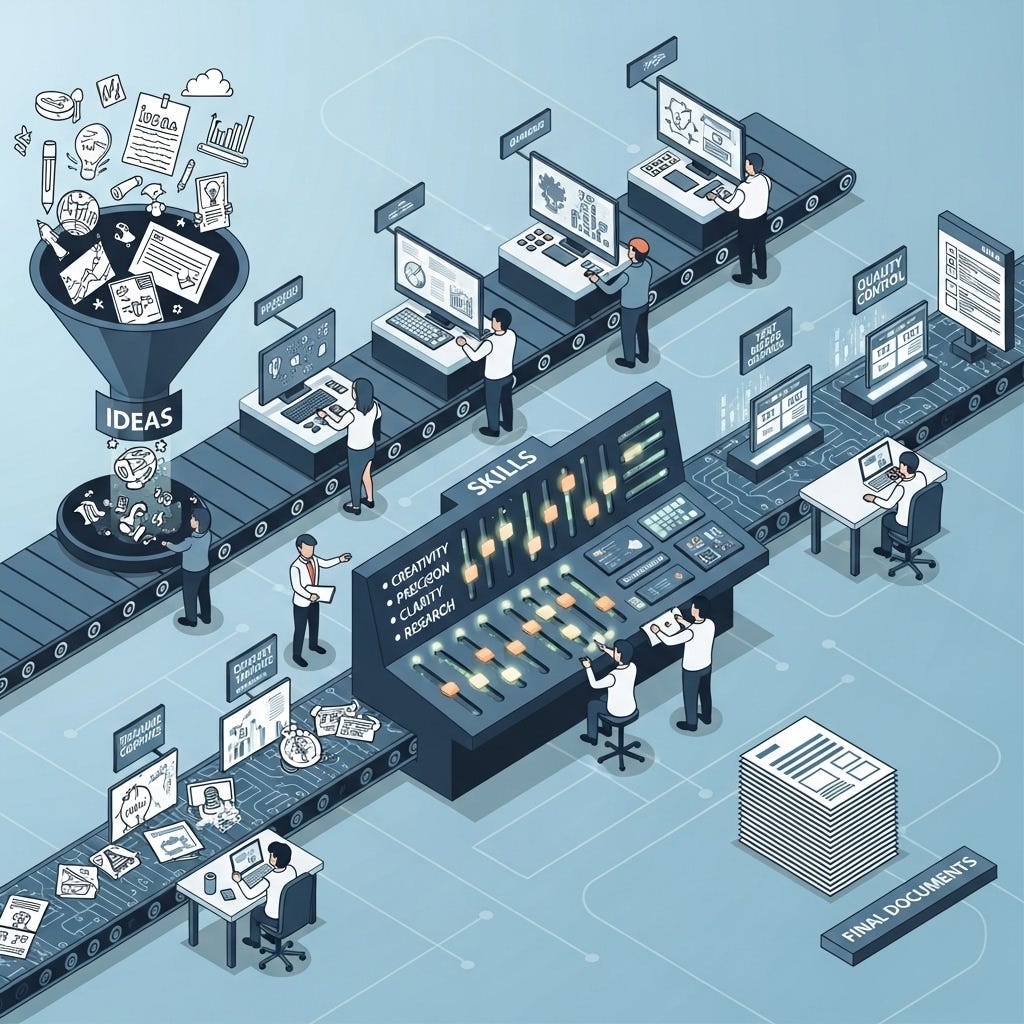Claude Skills: Turn Your Best Process Into Repeatable AI Work
Teach your AI once. Get the same quality every time. No heroic prompts required.
Claude Skills: the moment AI starts working like your team
You know the drill. You finally teach the system how you want a task done, and a week later, you are back to copying prompts and hoping. The just-launched Claude Skills change that. Anthropic just gave Claude a way to learn your procedures once and reuse them across its apps, IDE, and API. Not theory. Shipping now.
What it is, in plain English
Skills are small folders that capture the way your company works. Inside each one is a simple instruction file that explains the steps to follow, plus any helper scripts or reference docs. When you ask Claude to do something, it scans the skills you have enabled, decides which one fits, and pulls in only what is relevant. Think of it as letting the AI read the right page of your playbook at the right moment, instead of pasting a giant prompt every time.
Two details matter for leaders. First, people who do not code can create useful skills in minutes. You describe the job, point to examples, and package the files. Second, the same pattern shows up across Claude’s surfaces. Capture a process once, and your team can use it wherever they work.
Why this matters now
Most teams run into two walls with AI. Inconsistent results and context limits. Skills help on both fronts.
By moving procedures and bulky references into files, you stop rewriting prompts, and you keep the chat lean until something is truly needed. That reduces rework, speeds up draft one, and cuts token waste. And because the steps live outside the chat, you can evolve the process like any other playbook without retraining everyone on a new magic prompt.
Zoom out. This is part of a bigger shift from chat to dependable assistants. The goal is not clever answers. It is predictable, on-brand work that stands up to client review. Skills push the model in that direction by grounding it in your method.
What it changes for your team or clients
Here’s the shift. Instead of heroic prompts, you create repeatable playbooks.
Picture a client proposal pack that always follows your pricing rules and slides layout without babysitting. Or a QBR builder that pulls the same four metrics every time, checks the math, and tees up the story you want to tell. Or a legal intake triage that applies your conflicts checklist and produces a clean matter brief for first review. The output is not magic. It is your method, bottled.
One more advantage. Skills can include code for the parts that should be deterministic. You can have Claude run a small script to transform data, validate totals, or enforce naming. Use language for judgment, code for precision. That mix is how you raise the floor.
Risks and tradeoffs
Let’s be direct.
Clarity still wins. If your ask is vague, your results will be too. Skills make consistency easier, not thinking unnecessary.
Governance matters. Treat skills like software. Review contents before enabling, decide who can publish org-wide, and prefer trusted sources. If a skill includes code or calls packages, know what it is doing and where data might go.
Licensing can bite you. Some example skills are permissive, others are not. If you intend to adapt or share, check the license first and set a standard for your team.
Portability is promising but not guaranteed. The pattern is spreading across vendors, yet small differences will remain. Write skills clearly, document assumptions, and expect light refits if you move providers.
What to do on Monday morning
Turn on Skills in your Claude settings and enable file creation and code execution if you want the full capability.
Pick one repetitive, high-impact workflow. The one your team rewrites weekly and still fixes after the fact.
Use the built-in creator pattern to draft version one. Describe the job as if you were handing it to a new hire. Add one or two reference files, not ten.
Pilot with three people for three days. Track time saved, edits avoided, and where the skill triggers when it should. Tighten the description to reduce false hits.
Standardize and scale. Put skills under version control, assign owners, and add a simple review gate. Decide which skills are org-wide and which are team-specific.
The business case
Here is the math I would use with any client. At $25 per user per month, if a person saves two hours a month, you are ahead. Most teams will beat that by a lot once they bottle their top five processes. The real return is not only time. It is quality and repeatability. Your best people set the pattern, and everyone benefits. That means fewer do-overs, tighter drafts, and faster cycles from ask to finished work.
The close
Skills move AI from prompt roulette to repeatable work. Teach it once. Get the same quality every time. If you are running a team, that is the point. Consistency scales. And this is how you get it.
Business leaders are drowning in AI hype but starving for answers about what actually works for their companies. We translate AI complexity into clear, business-specific strategies with proven ROI, so you know exactly what to implement, how to train your team, and what results to expect.
Contact: steve@intelligencebyintent.com
Share this article with colleagues who are navigating these same questions.


